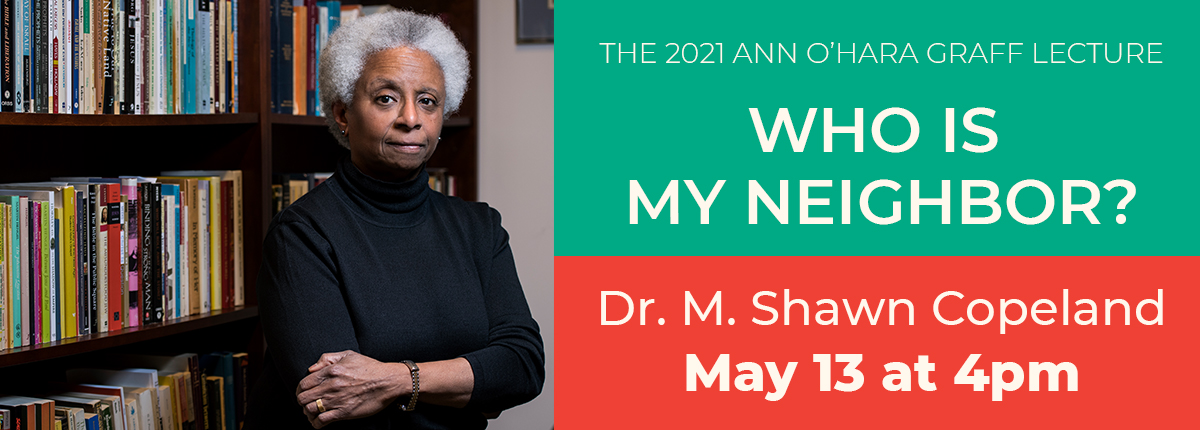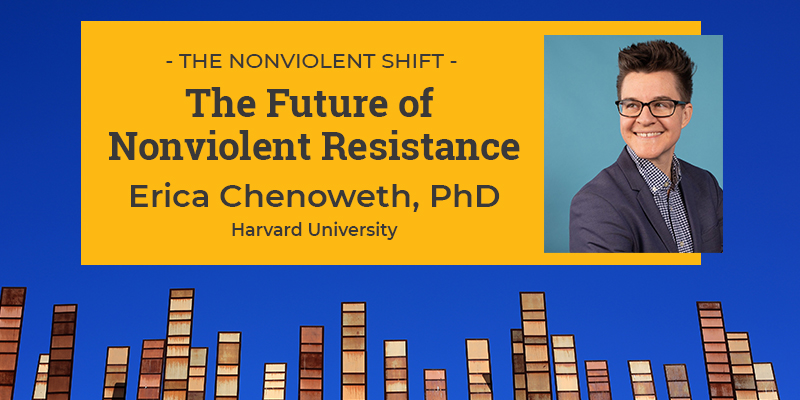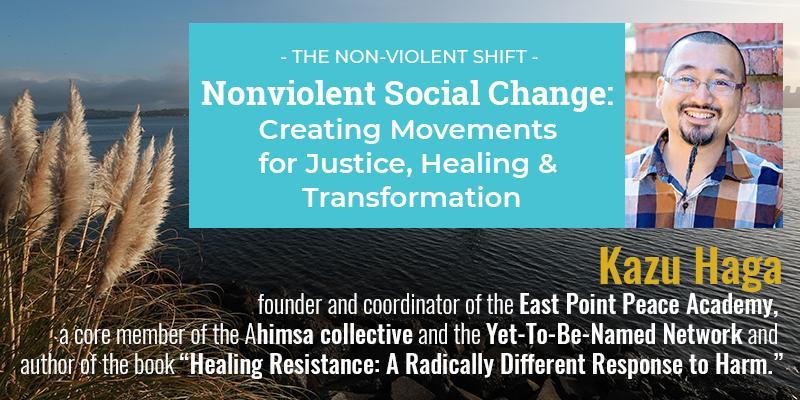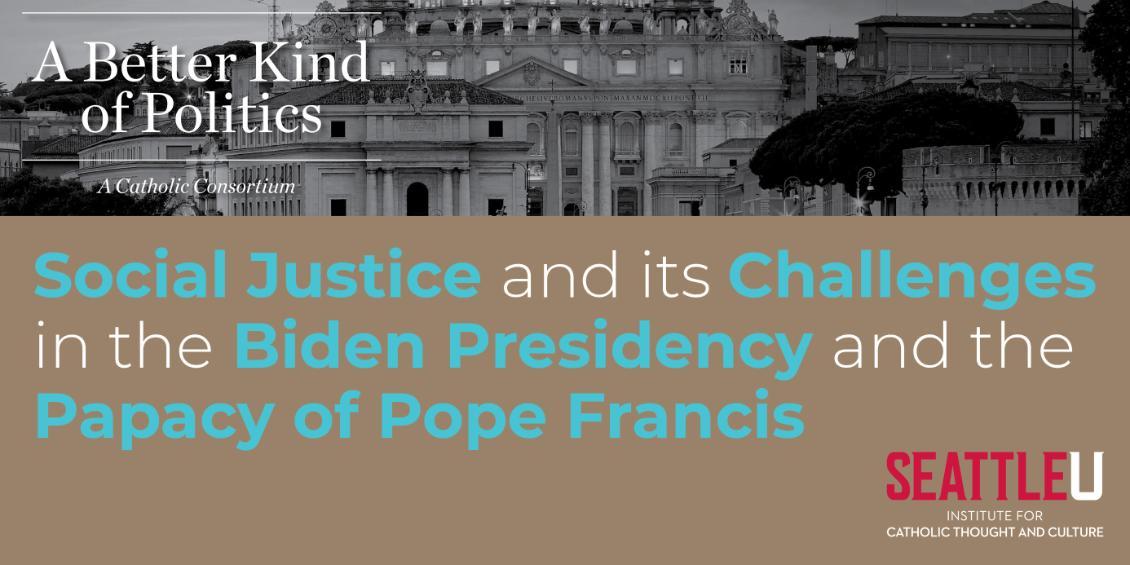
2020-21 Events
Social Justice and its Challenges in the Biden Presidency and the Papacy of Pope Francis
Wednesday, May 26 at 4pm PST on Zoom
ICTC joins “A Better Kind of Politics,” a consortium of Roman Catholic institutions, in a series of online discussions around topics relating to Pope Francis’ call in Fratelli Tutti for a renewal of politics through social and political charity measured by how we treat our neighbors, especially those “lying wounded along the roadside."
Dr. Connie Anthony and Dr. Patrick Schoettmer from SU's Political Science Department and Dr. Hosffman Ospino from Boston College's School of Theology and Ministry will discuss how, through the lens of social justice, the ideals of the Biden presidency and Pope Francis’ Fratelli Tutti inform and challenge the U.S.’s existing politics, both nationally and internationally, and including immigration policies. Dr. Jeanette Rodriguez, ICTC Director, will moderate the conversation.
Interreligious Dialogue Initiative Conversation with Darrell Hillaire and Pat Twohy, SJ
May 19, 4-5:30pm on Zoom
Please join us for this unique opportunity to learn about eco-spirituality from two cherished spiritual leaders. The topic will be twofold: Lummi spirituality in dialogue with Jesuit spiritual practice as well as Lummi reflections on ecology and earth care.
Darrell Hillaire, a highly esteemed leader and the executive director of Tse-sum-ten and Setting Sun Productions, has served as a coach, mentor, teacher, and leader for the Lummi Nation for more than twenty years (read more here). Pat Twohy, SJ is the author of two seminal works, Finding a Way Home and Beginnings: A Meditation on Coast Salish Lifeways. He has lived with and served i Save and approve ndigenous peoples of the Northwest for four decades, including eleven years with the Colville Confederated Tribes in Eastern Washington and more recently the Swinomish and Tulalip Tribes of the Coast Salish Peoples.

The Spring 2021 Ann O’Hara Graff Lecture (cosponsored with THRS, in lieu of the CHL lecture) on May 13
Who Is My Neighbor? A lecture and conversation with Professor M. Shawn Copeland
As we peoples of Earth continue to grapple with the lethal coronavirus, we are beset with grave existential, spiritual, and intellectual suffering. Moreover, we in the United States are grappling with waves of white racist supremacy. To answer the question, ‘Who is my neighbor?’ in deeds as well as in words requires that we rethink what it means to be human and what it means to live humanely in a world shaped by legacies of racial domination and oppression.
The ICTC is pleased to co-sponsor this year's Ann O'Hara Graff Lecture, an annual event hosted by the Theology and Religious Studies Department (This lecture will be in lieu of the Spring Catholic Heritage Lecture). An award-winning author, Dr. Copeland has written and/or co-edited six books including her Knowing Christ Crucified: The Witness of African American Religious Experience and Enfleshing Freedom: Body, Race, and Being, and no less than 125 articles, book chapters, reviews, and blog entries on spirituality, theological anthropology, political theology, social suffering, gender and race. She is the recipient of six honorary degrees. Read more about Dr. Copeland here.

The Future of Nonviolent Resistance
Erica Chenoweth, Harvard University
Wednesday, April 21, 12:30-2pm PST via Zoom
This talk will explore a paradox in the nonviolent resistance movements today: while such movements are now more common than in any other period in recorded human history, they have also been defeated at a higher rate than at any other point in the last 70 years. Dr. Chenoweth will offer several explanations for this seeming paradox and discuss a path forward for nonviolent resistance movements seeking to build their advantage.
Erica Chenoweth, Ph.D. is the Frank Stanton Professor of the First Amendment at Harvard Kennedy School and a Susan S. and Kenneth L. Wallach Professor at the Radcliffe Institute for Advanced Study. Chenoweth directs the Nonviolent Action Lab at Harvard’s Carr Center for Human Rights Policy, where they study political violence and its alternatives. Foreign Policy magazine ranked Chenoweth among the Top 100 Global Thinkers in 2013 for their efforts to promote the empirical study of nonviolent resistance. Learn more about Dr. Chenoweth here.

Nonviolent Social Change: Creating Movements for Justice, Healing & Transformation
A training for Seattle University Students
Friday, February 19, 3:30-5:30pm via Zoom
Nonviolent action has been proven as the most effective way to create systemic change, and yet the principles and strategies are often times a mystery to many. Join us as we explore some concrete practices and strategies in building nonviolent movements for change.
A training for Seattle University Faculty and Staff
Tuesday, February 23, 3:45-5:45pm via Zoom
As university faculty and staff, how can you best support students who are working to create change? Learn some of the basics of nonviolent movement strategy so that you can both understand what you may be witnessing on your campus and how best to support it, as well as exploring how to institutionalize nonviolent practices within your department.
Kazu Haga is the founder and coordinator of the East Point Peace Academy, a core member of the Ahimsa collective and the Yet-To-Be-Named Network and author of the book Healing Resistance: A Radically Different Response to Harm. He is an experienced trainer, certified in several methodologies of nonviolence and restorative justice. Having received training from elders including Dr. Bernard Lafayette, Rev. James Lawson and Joanna Macy, he teaches nonviolence, conflict reconciliation, restorative justice, organizing and mindfulness in prisons and jails, high schools and youth groups, and with activist communities around the country.
Kazu was introduced to the work of social change and nonviolence in 1998, when at the age of 17 he participated in the Interfaith Pilgrimage of the Middle Passage; a 6-month walking journey from Massachusetts to New Orleans to retrace the slave trade. He spent a year studying nonviolence and Buddhism while living in monasteries throughout South Asia, and returned to the US at age 19 to begin a lifelong path in social justice work.
He spent 10 years working in social justice philanthropy, while directly being involved in and playing leading roles in many movements. He became an active nonviolence trainer in the global justice movement of the late 1990s, and has since led hundreds of workshops worldwide.
He is the recipient of several awards including the Martin Luther King Jr. award and the Gil Lopez Award for Peacemaking.
Kazu is an avid meditator and enjoys being in nature, particularly with his dog. He is a die-hard fan of the Boston Celtics and of mixed martial arts, the latter of which he is still sometimes conflicted about.
He resides in Oakland, CA.
